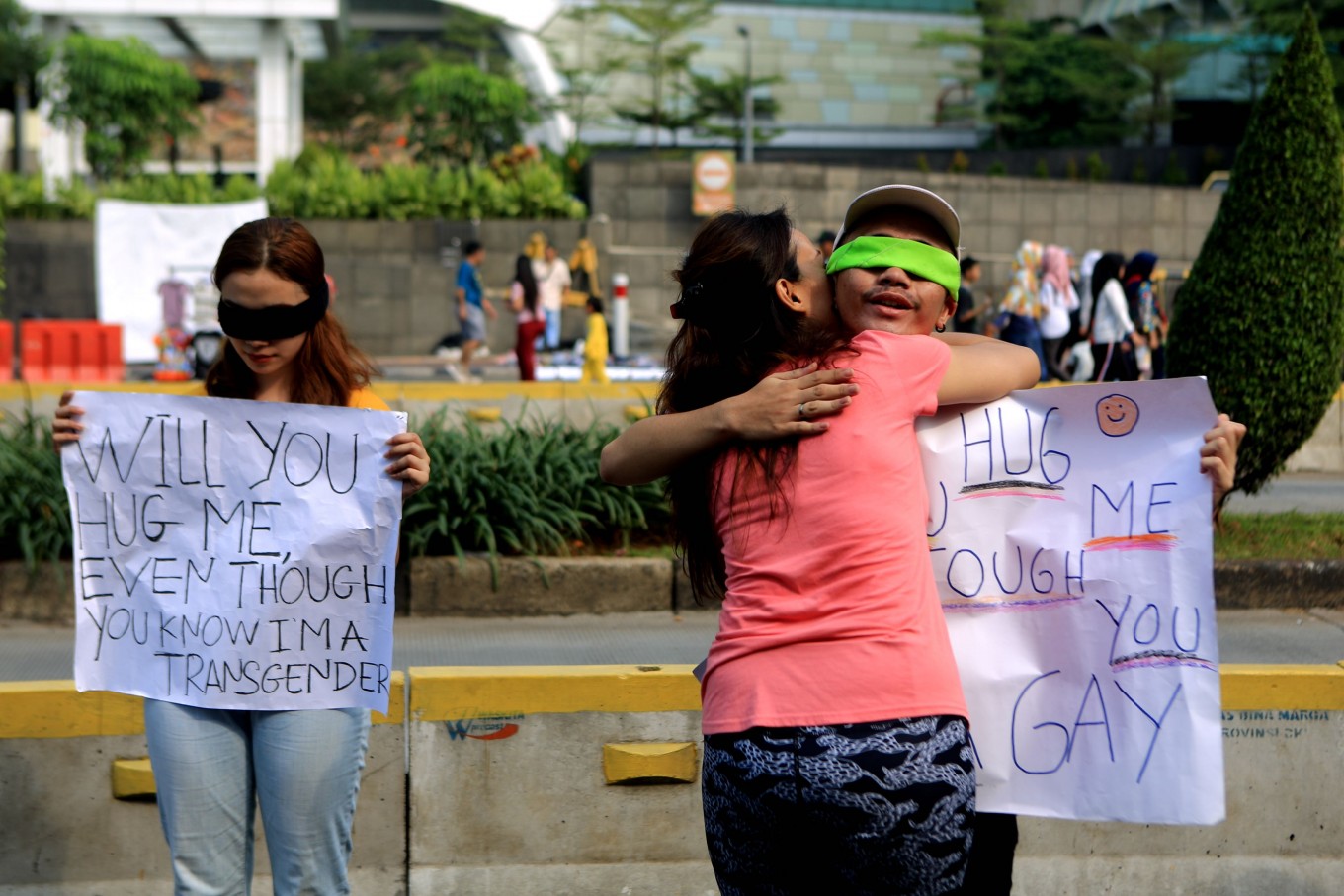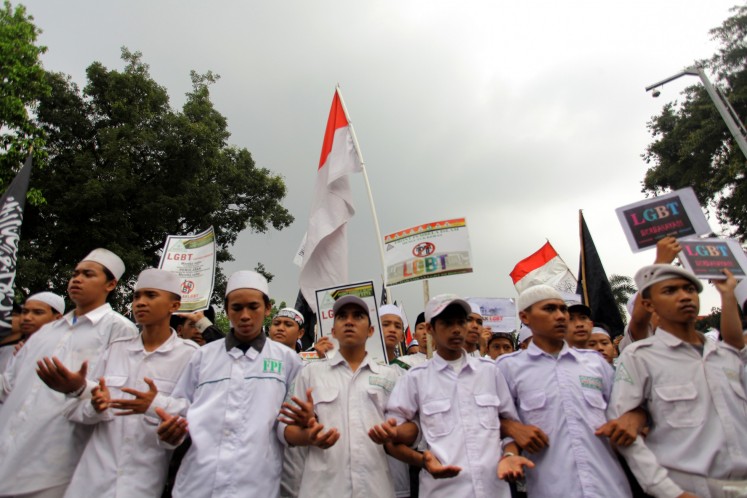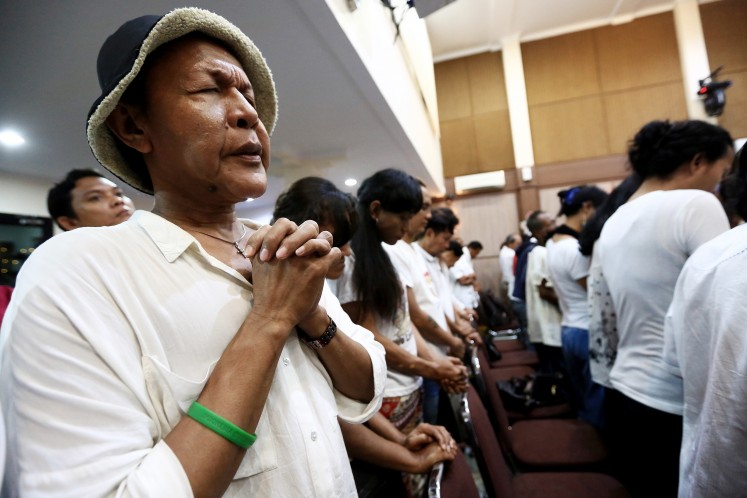Popular Reads
Top Results
Can't find what you're looking for?
View all search resultsPopular Reads
Top Results
Can't find what you're looking for?
View all search resultsIndonesian LGBT community pins hopes on youth for better, more tolerant future
Change text size
Gift Premium Articles
to Anyone
I
n an ever more religiously conservative Indonesia, LGBT people are living in fear for their safety, yet they still have hope deep inside for a more tolerant community in the future.
Si Lexa (a pseudonym) is a 22-year-old Indonesian who has been studying in Australia for the past few years.
Si is set to graduate next year, which for most people, would be an exciting thought.
For Si, graduating means having to return to Indonesia, a terrifying prospect because Si is a double minority, being both bisexual and Christian.
“Since 2016, I’ve seen religious conservatives vocalising the idea that queer people are seen as a bad influence,” Si said.
“I’ve even seen some instances where workplaces and universities have openly stated they don’t want queer people.”
These statements are nothing new for the LGBT (lesbian, gay, bisexual, transgender) community in Indonesia, where “every week, there is at least one statement spreading anti-LGBT rhetoric,” said Dede Oetomo, founder of GAYa Nusantara, Indonesia’s oldest LGBT advocacy group.
Hate and fear: Thousands of anti-LGBT demonstrators march in Bogor, outside the capital Jakarta, on Nov. 9, 2018. Indonesia's LGBT community is under attack as a spike in hateful rhetoric and record number of arrests raise fears that the vulnerable group could be targeted for violence, critics say. (AFP/Sandika Fadilah Rusdani)Things were not always this way.
When Dede first started his organization in the 1980s, LGBT people were tolerated in many communities.
“The attitude was ‘live and let live’. Of course, homophobia and transphobia were there but they were not expressed as vocally and shamelessly,” Dede said.
“I’ve heard many awful statements like ‘we should get rid of them’ and ‘we should reduce their numbers.’”
He attributes this change in attitude to the increased polarization of Indonesian society.
LGBT Indonesians have seen a spike in anti-LGBT rhetoric since 2016, which Human Rights Watch Indonesia senior researcher Andreas Harsono described as a government-driven “moral panic” that has “manufactured fear and violence against the LGBT community.”
Numerous public and derogatory statements by conservative leaders, religious clerics and government officials have associated the term LGBT with mental illness and HIV/AIDS, among other things.
Mahfudz Siddiq, former member of the House of Representatives claimed “LGBT issues can damage national security, identity, culture and the faith of Indonesians.”
Keep the faith: Christian transgenders pray during a Christmas celebration at the Bethel Church of Indonesia (GBI) in Ampera, Jakarta, in December last year. (JP/Dhoni Setiawan)Since the proliferation of public anti-LGBT statements, there has been a surge in raids at saunas and salons on suspicion that gay or trans-people were inside.
Human Rights Watch claimed that at least 300 people were apprehended by police on suspicion of being LGBT in 2017, the highest number ever recorded in Indonesia.
More recently, some of the proposed revisions to articles in the criminal code could send LGBT people to prison for “obscene acts” in public.
“If the bill is approved, it’s going to be like hell for LGBT people,” Andreas said.
Dede said the most extreme impact that moral panic has had on the LGBT community in Indonesia is that people leave the country.
“People who can afford it or are educated will seek asylum, usually in Canada, whereas working class people try to work or study in other countries. There they don’t have to worry all the time,” he said.
Such is the case for Tata Soewarno, a 22-year-old Muslim gay man, who returned home to Jakarta last month after studying in the United States.
“From an abroad perspective, it seemed like a hellhole here. I was kind of refusing to come home,” Tata said.
Tata thinks things will be different for the LGBT community in the future.
“Because we have a huge young population, and in 10 to 20 years, the ones holding the positions will be this generation coming along,” he said.
Ann Boedi (not her real name), a 25-year-old lesbian woman who studied in Australia, also felt the fear of returning to Indonesia. She returned to Indonesia a few years ago.
“I was scared to come back not only because I’m lesbian but also because I’m another minority. I’m a Catholic,” she said.
“I saw big anti-LGBT banners from radical Muslim communities with statements like ‘people here reject drugs, theft, robbery and LGBT’”
While some of Ann’s friends have already fled to Canada for asylum, she intends on staying in Indonesia.
“I used to work for the United Nations here, so I have access to immunity and security if anything happens to me, which is different to people who are more easily detected, such as trans-women and gay men,” Ann said.
Ann believes that things will improve, as many young LGBT people are becoming more politically involved, and their progressive ideologies can encourage other representatives to be more open-minded.
Dede similarly believes the situation will get better, with a growing young population and LGBT rights movement.
The movement for LGBT rights has not stopped, according to Dede.
“We’ve actually acquired new allies since 2016 because there are more people who believe in human rights and democracy,”
“The politicians, the people who are homophobic and transphobic are from a different generation. The growing young population are a different crowd.”
Shelley Cheng and Grace Desoe traveled to Indonesia with the support of the Australian Government’s New Colombo Plan Mobility Scheme.













